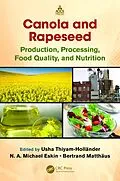In 2010, esteemed researchers gathered at a workshop held at the Richardson Centre for Functional Foods and Nutraceuticals at the University of Manitoba in Winnipeg, Canada. Drawn from these proceedings, Canola and Rapeseed: Production, Processing, Food Quality, and Nutrition presents state-of-the-art information on the chemistry of the minor const
Autorentext
Usha Thiyam-Holl er is an assistant professor at the Department of Human Nutritional Sciences, based at the Richardson Centre for Functional Foods and Nutraceuticals, University of Manitoba, Canada, where she researches the impact of various novel aspects of processing on canola oil and minor components. Her work also focuses on plant-based functional foods and nutraceutical ingredients and the impact of innovative technology, isolation, and optimization. Her interests include biorefining and environmentally friendly processes for deriving functional ingredients.
Michael N.A. Eskin
Bertrand Matth runs a laboratory at the Max Rubner-Institut (MRI), Federal Research Institute for Nutrition and Food, in the Department of Lipid Research of the German Federal Ministry of Nutrition, Agriculture and Consumer Protection. He conducts research dealing with the improvement of the quality of fats and oils, especially canola oil. His work focuses on the investigation of frying processes; contaminants such as 3-MCPD esters, acrylamide, phthalates and 4-hydroxy-2-trans-nonenal; and the investigation of the oxidation of edible fats and oils.
Inhalt
Canola Research: Historical and Recent Aspects. An Update on Characterization and Bioactivities of Sinapic Acid Derivatives. Valuable Vinylphenols from Rapeseed and Canola: Decarboxylative Pathways. Processing of Canola Proteins: A Review. The Future of Omega- Oils. Modification of Seed Oil Formation in. Oilseed Species. Measurement of Oil Content by Rapid Analytical Techniques. The Potential for Ultrasound and Supercritical Fluid Extraction for Value-Added Processing of Canola. Processing of Virgin Canola Oils. Rapeseed Proteins: Recent Results on Extraction and Application. Frying Stability of High-Oleic, Low-Linolenic Canola Oils. Biodiesel from Mustard Oil. Canola Oil and Heart Health: A Historical Perspective. Canola Oil: Evolving Research in Obesity and Insulin Resistance. Rapeseed and Canola Phenolics: Antioxidant Attributes and Efficacy. Nutritional Impact of Fatty Acid Composition of Canola Oil and Its Effect on the Oxidative Deterioration. Effect of Canolol on Oxidation of Edible Oils. Canola Oil, Canolol and Cancer: Evolving Research. Canolol as a Promising Nutraceutical: Status and Scope. Index.
